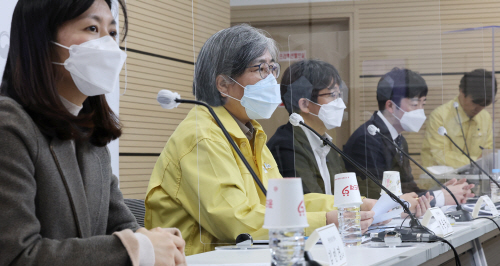 |
| Jeong Eun-kyeong, commissioner of the Korea Disease Control and Prevention Agency (KDCA), speaks during a special briefing held at the KCDC in Cheongju on Jan. 27, 2022. / Source: Yonhap |
AsiaToday reporter Lee Sun-young
South Korea could see daily COVID-19 cases of over 100,000, experts say. As daily infections are doubling faster than health authorities had forecast, many experts say the country’s omicron surge is likely to continue for the next several weeks. The government has launched the omicron response system, but there are concerns that a sudden explosion in infections could overwhelm hospitals and cause disruption at workplaces and essential services.
Jung Jae-hoon, a professor of preventive medicine at the Gachon University College of Medicine in Incheon, said South Korea’s omicron surge will likely to continue for five to eight weeks, and that the country could see daily cases of over 100,000. The country reported 14,518 new infections on Thursday, an increase of 1,508 from the previous day.
In preparation for overload due to the explosive cases, the government has been running the omicron response system starting Wednesday, under which polymerase chain reaction (PCR) tests are available only to high-risk groups residing in four parts of the country that have seen widespread omicron infections - Pyeongtaek and Anseong cities in Gyeonggi-do Province, Gwangju and Jeollanam-do Province. The new rules will be implemented nationwide from February 3.
Amid concerns that those excluded from the medical system, that focuses on high-risk groups, could see their health conditions getting worse rapidly, one public hospital in Anseong has been running a pilot program since October in a model that could be replicated in other South Korean cities. The program is coordinated with the city government’s health center, which acts as an initial triage location, and works with local transportation networks to provide secure taxis or shuffle buses for patients without their own vehicles.
“The government, local governments and medical institutions are working together to seek ways to speed up the medical system efficiently and save patients’ lives,” said Lim Seung-kwan, head of the Gyeonggi Provincial Medical Center in Anseong, 70 kilometers south of Seoul.
Under the pilot program, a female patient in her 40s in critical situation was sent to hospital within an hour without waiting for the KDCA’s bed assignment on Tuesday.
Regarding the shortcomings of rapid COVID-19 tests, KDCA chief Jeong Eun-kyung said it was inevitable for the country to save its PCR capacities for high-risk groups. She admitted that transmissions could worsen if those who test false negative continued to venture out in public. She pleaded for people to continue wearing masks and exercising precaution after negative tests and try another test ki if they experience symptoms.
Experts say that although re-infections may occur due to the spread of the ultra-contagious omicron, the risk is not greater in certain age groups, such as infants. However, they said vaccination is beneficial and the risk of infection is greater for unvaccinated people.
“Since the omicron is highly contagious compared to other previous variants, immune cells that had been infected may not remember it and recognize it as a new virus and thus cannot respond appropriately. The omicron mainly affects the upper respiratory tract, causing milder symptoms than previous variants,” said professor Kim Min-kyung at the National Medical Center.
Currently, the Ministry of Food and Drug Safety is reviewing data for approving COVID-19 vaccine for children aged 5-11.
#omicron #doubling
Copyright by Asiatoday
Most Read
-
1
-
2
-
3
-
4
-
5
-
6
-
7





















